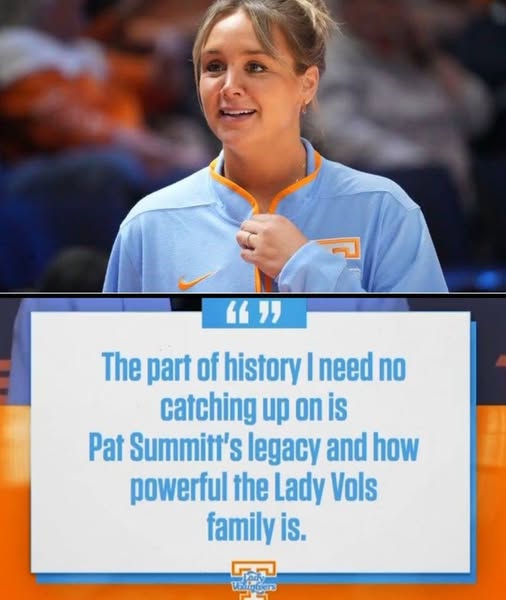Sure! Here’s a full-length article draft based on your request, titled:
The Legacy of Pat Summitt: The Sweetheart of Success, a Beacon of Grace, Forever Setting the Gold Standard in the Game and in Life
Word Count: ~1500
When one speaks of excellence, legacy, and resilience in sports, few names carry the magnitude of Pat Summitt. More than a coach, she was a pioneer, a mentor, a trailblazer, and above all, a beacon of grace in a fiercely competitive landscape. With an astounding 1,098 career wins, eight NCAA championships, and a spirit that redefined women’s athletics, Summitt set a standard that may never be matched—on or off the court.
From her humble beginnings on a dairy farm in Henrietta, Tennessee, to becoming the winningest coach in NCAA Division I basketball history at the time of her retirement, Summitt’s journey was nothing short of legendary. But her legacy extends far beyond the record books. She changed perceptions. She shattered ceilings. She built an empire at the University of Tennessee, while building character and empowering countless young women to become champions not only in basketball, but in life.
Born Patricia Sue Head on June 14, 1952, she grew up with a toughness forged from rural life—early mornings feeding cattle, hay bales, and a family that valued discipline. That rugged upbringing translated seamlessly into her coaching style: demanding but deeply rooted in love and belief in her players.
In 1974, at just 22 years old, Pat Head Summitt was hired as the head coach of the Lady Vols. She was so young she had to drive the team van and wash uniforms herself. At the time, women’s college sports were still on the fringe, lacking funding, exposure, and respect. But from the beginning, Summitt didn’t just want to win—she wanted to elevate.
And elevate she did.
Her teams earned eight national championships (1987, 1989, 1991, 1996, 1997, 1998, 2007, 2008), 18 Final Four appearances, and she was named Naismith Coach of the Century in 2000. Yet her true genius lay in her ability to evolve with the game. She recruited, mentored, and coached some of the best to ever lace up sneakers—Tamika Catchings, Chamique Holdsclaw, Candace Parker, and many more.
While her success on the court was staggering, Summitt’s greatest triumphs were often off the court. Under her leadership, the Lady Vols achieved a near-perfect graduation rate. Her players didn’t just become WNBA stars—they became doctors, coaches, educators, leaders.
Summitt taught more than Xs and Os. She taught accountability, responsibility, and toughness. Her infamous stare—equal parts intense and inspirational—motivated players to dig deeper, push harder, and expect more of themselves.
She was also deeply respected by her peers and adversaries alike. Geno Auriemma, head coach of UConn and one of her fiercest rivals, once said, “You always knew that if you beat Tennessee, you really accomplished something. Pat never gave anything away.”
Pat Summitt’s legacy wasn’t just forged in trophies and accolades—it was in her unwavering authenticity. She carried herself with poise and humility, often deflecting credit to her players and staff. She could command a locker room with a whisper or ignite a fire with a stare.
Her relationship with Tennessee fans was equally special. To them, she wasn’t just a coach—she was family. Neyland Stadium and Thompson-Boling Arena often echoed with chants of her name, a testament to how deeply she was cherished in the Volunteer State.
She was dubbed “The Sweetheart of Success” because she made winning feel graceful. She didn’t need bravado—her accomplishments roared for her. She believed in the process, in people, and in doing things the right way.
In 2011, at age 59, Pat Summitt publicly announced her diagnosis of early-onset Alzheimer’s disease. True to her nature, she faced it head-on—courageously and without self-pity. “It is what it is,” she famously said. “But it doesn’t have to be a death sentence.”
She stepped down from coaching the next year but remained an indomitable presence in the program. Her fight against Alzheimer’s sparked the founding of the Pat Summitt Foundation, aimed at finding a cure and supporting families affected by the disease.
Through her battle, the grace and grit that defined her career shone brighter than ever. She continued to inspire millions—not just as a coach, but as a human being whose strength transcended the sideline.
Pat Summitt’s list of honors is as long as it is distinguished. She was inducted into the Women’s Basketball Hall of Fame in 1999, the Naismith Memorial Basketball Hall of Fame in 2000, and received the Presidential Medal of Freedom from President Barack Obama in 2012.
Perhaps most telling of her impact was the outpouring of emotion when she passed away on June 28, 2016. Tributes flowed from presidents, athletes, coaches, and fans. Candlelight vigils lit up the Tennessee campus. Her name echoed in arenas across the country.
And yet, the greatest tribute remains the legacy she built: strong, confident women prepared to tackle the world. Her fingerprints are all over women’s sports today, from the record TV ratings of NCAA women’s basketball, to the rising star power of players like Caitlin Clark, Angel Reese, and Paige Bueckers.
Pat Summitt didn’t just coach basketball. She reshaped what it meant to be a leader. She lifted a program, a university, and an entire sport. She led with heart, demanded excellence, and lived with humility.
In her honor, the court at Thompson-Boling Arena is now “The Summitt.” It’s a fitting tribute—because wherever greatness lives in women’s basketball, Pat Summitt’s spirit is there.
She will forever be remembered not just for the wins, but for the lives she touched and the barriers she broke. Her story is not just one of success—it’s a love story to the game, to her players, and to humanity.
In the words etched into her foundation’s mission: “With a heart of a champion and the soul of a servant, Pat Summitt was, and always will be, a force of nature.”
Pat Summitt’s life is a reminder that greatness isn’t just measured in championships or banners. It’s measured in how many lives you lift, how fiercely you love, and how courageously you fight.
She was—and remains—the sweetheart of success, a beacon of grace, and the gold standard in the game of basketball and in the game of life.
And her legacy? It’s still growing.
Would you like help with a headline image, or turning this into a layout for a site or newsletter?



